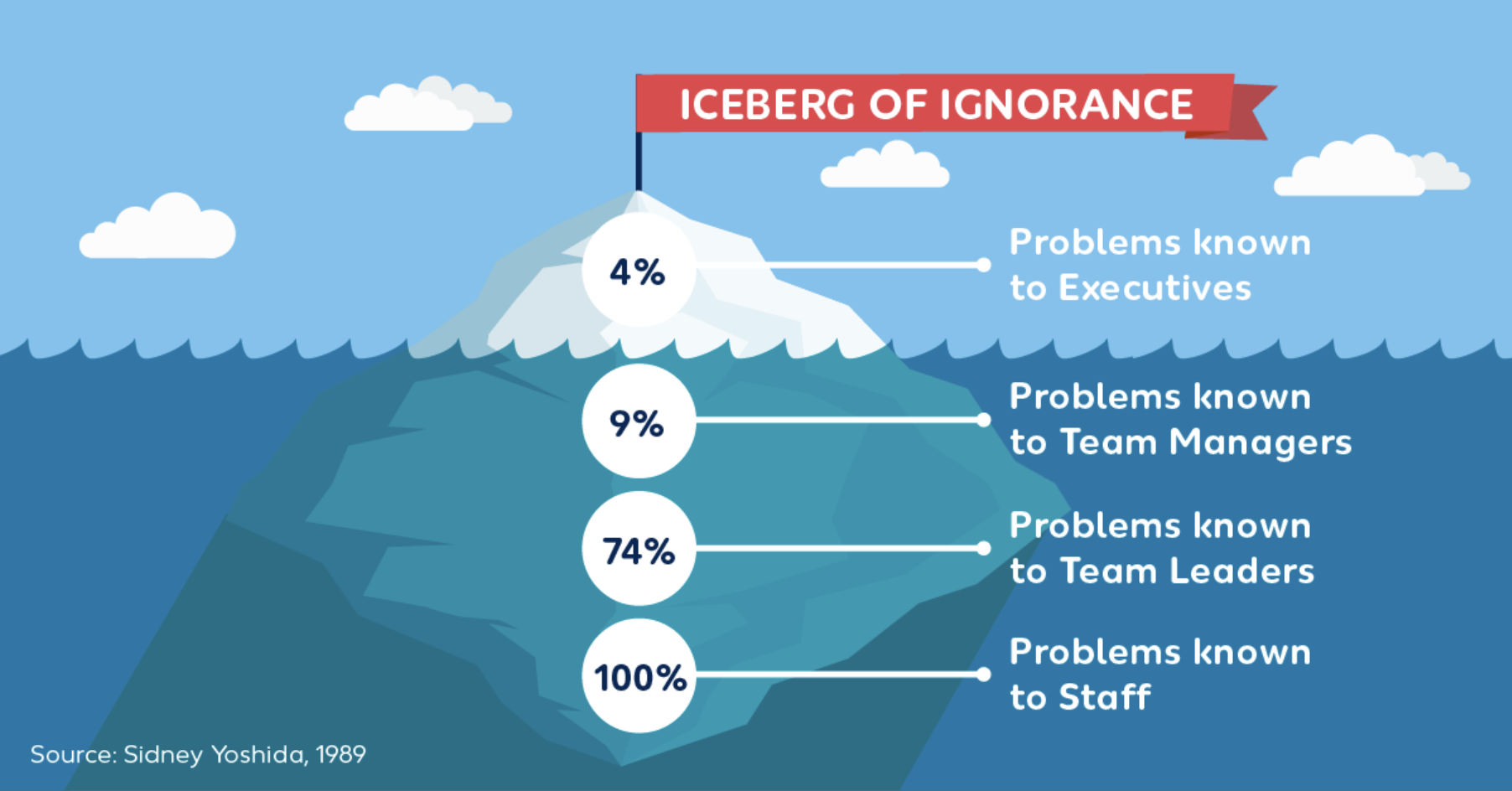90% of strategies fail - it's time to listen to the voice to change that

Employee Experience
Employee Insight
Culture
It's a concept coined back in 1989 by Sidney Yoshida, and still, it perfectly demonstrates how problems are shared and understood within an organisation.
According to Yoshida, top managers only know 4% of the issues their company face – that's just the tip of the iceberg!
On the flip side, I look at studies from PWC showing 93% of employees at an average company don’t understand the strategy. This is a very likely reason why Harvard Business Studies report that 90% of leadership teams fail to deliver on their strategy successfully. That’s a lot.
The results are at odds, and what’s the root issue? Communication.
When delivering on strategy, where each individual's contribution is the means of growth, we realise ignorance is certainly not bliss. It’s one of the leading factors holding us back from everything we want to achieve.

Embracing the voice of the employee
Now, let’s examine why transforming how you listen and
embracing the employee's voice is
beneficial and essential for forward-thinking leaders. Navigating this change in your work can pose challenges,
particularly when open critique
and honest feedback isn't prevalent within the workforce.
However, creating an environment
where every voice matters is genuinely transformational,
especially when designing a
company where people are proud, engaged and motivated to
achieve more.
Employee feedback to shape your benefits and engagement
strategy is the most relevant
and meaningful way is the most valuable data input you have
amid evolving challenges like
the cost of living crisis, the war on talent and changes to
government legislation. Listening to
your team's insight has never been more imperative.
Fostering a culture of transparency isn't just beneficial; it's crucial. It strengthens the backbone of your Employee Value Proposition by championing open dialogue.
Let's explore how feedback can profoundly impact your benefits strategy and your organisation as a whole:
1. Empowering Voices: At the core of progressive companies lies a common understanding: the importance of giving every employee a voice. An example from a global tech company I worked with is the 'Safely Home' initiative, inspired by the collective concern over safety in commuting, especially during darker hours. This move supported wellbeing and reinforced the safety net they strive to provide for team members.
2. Fostering Community: The real magic occurs when your employee benefits spark the creation of a vibrant internal community. Champions emerge and drive engagement. An insightful session I listened to by Faye Mclean from Eve Sleep, shared an empowering tale of how employee-driven discussions led to the flexible allocation of bank holidays, a testament to communal influence on organisational improvements.
3. Catalysing Conversations: Encouraging open forums can enable meaningful debates, paving the way for meaningful enhancements in your benefits offering. These discussions are instrumental in showing employees their voices are not just heard, but can effect change. This democratic approach ensures that your benefits strategy evolves, mirroring the collective will and making employees proud to be part of the process.
Anecdotal feedback underpinned with powerful
analytics
Integrating targeted surveys and leveraging diverse feedback
channels amplifies our
understanding, enabling us to tailor benefits that echo our
employees' needs and
aspirations. Take it one step further by incorporating
insights from Diversity, Equity, and
Inclusion (DEI) network leaders into the benefits review
process ensuring an inclusive lens is
applied, embracing the vast needs of a varied workforce.
From leaders starting with simple suggestion boxes to those
who have invested in
technology that can measure the moments that matter.
Whatever stage they’re at on
opening up two-way feedback in their business and focusing
on transparency, they’re all on
track to achieve more than ever.
There are so many tools to help. You can quickly scale your
listening capabilities up with
easy-to-use, accessible tech and open to your ears to eager
employees from every corner of
the earth.
Embarking on this journey towards more engaging,
employee-centred strategy development
is not just a smart move for business; it's a statement of
your organisational values. It signals
a commitment to not just listen, but respond and adapt,
fostering a culture of shared trust
and mutual respect. A place where everyone feels valued,
respected and like they belong.
I’d love to hear your stories of how you’re engaging with
your employees to shape a more
inclusive, responsive benefits landscape and I look forward
to exploring this more in
February at the Employee Xperience Expo. Let's champion people and take a step closer to success.

